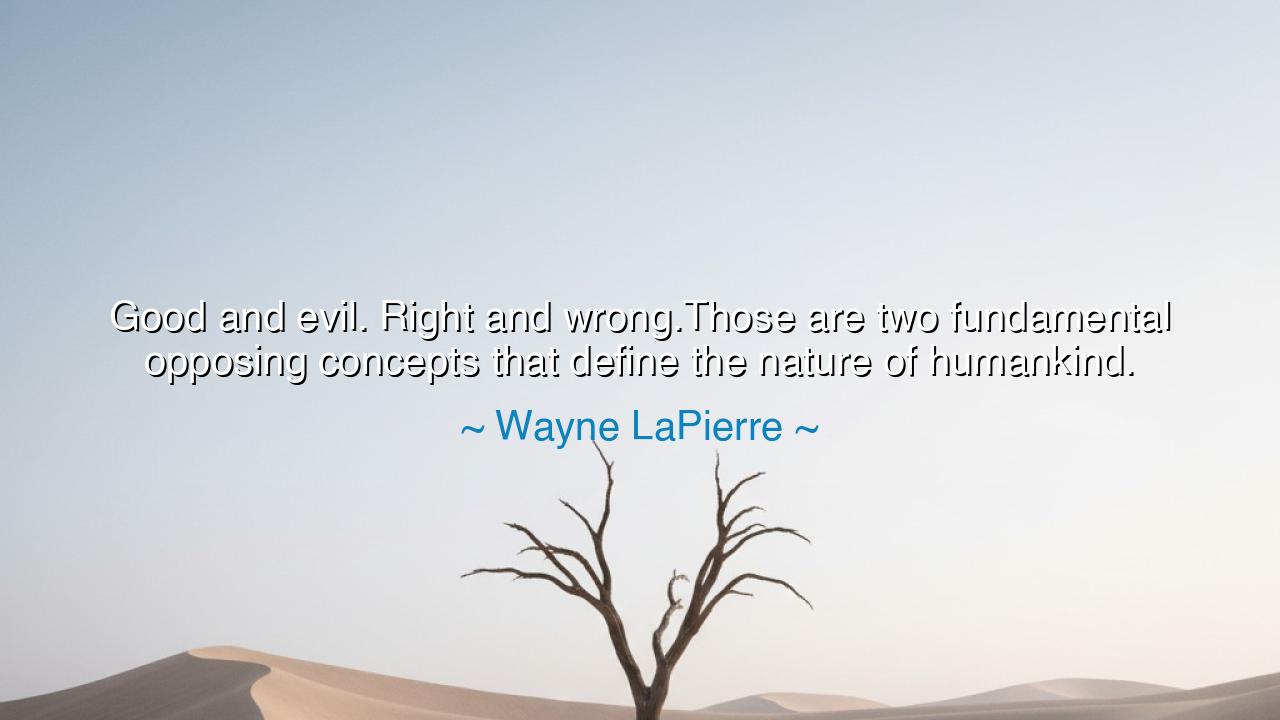
Good and evil. Right and wrong.Those are two fundamental
Good and evil. Right and wrong.Those are two fundamental opposing concepts that define the nature of humankind.






Hear the solemn words of Wayne LaPierre: “Good and evil. Right and wrong. Those are two fundamental opposing concepts that define the nature of humankind.” Within this declaration resounds the eternal struggle, the battle not of nations alone, but of the human heart. For from the dawn of time, man has stood at the crossroads, hearing the voice of virtue on one side and the whisper of vice on the other. These are not abstractions carved only in philosophy—they are the very forces that mold destiny, both of the individual and of the world.
The ancients knew this truth well. The Greeks told of Heracles at the crossroads, where the hero was approached by two women: one fair with dignity, who promised him toil and honor, and the other radiant with false delight, who promised him ease and pleasure. This tale is not merely myth but mirror, reflecting the choice each soul must make: whether to walk in the way of right or to stumble into the path of wrong. LaPierre’s words remind us that this division is not a creation of society, nor of politics, but a law written upon the soul of humankind.
Consider also the story of Oskar Schindler, a man who lived in the shadow of one of history’s darkest evils. Surrounded by cruelty, he could have walked in indifference, profiting from war as many did. Yet when faced with the choice, he turned to good, using his fortune and influence to save the lives of over a thousand Jews. His story shines as proof that even when evil seems to rule, the human spirit still possesses the freedom to choose the path of right. His deeds echo LaPierre’s truth: that humankind is defined not by circumstance but by the choices between good and evil.
But what is good? And what is evil? Good is the lifting of others, the pursuit of justice, the courage to sacrifice for what is noble. Evil is the betrayal of conscience, the grasping of power without care for its cost, the destruction of others for selfish gain. These are not gray illusions—they are opposites, locked in conflict, shaping the fate of societies. Though philosophers may blur the lines, though skeptics may deny their absolutes, the heart knows them, for the heart trembles when it crosses into darkness and soars when it walks in light.
LaPierre’s words carry also a warning. To forget the distinction between right and wrong is to strip humanity of its compass. A people who blur the line between virtue and vice are like sailors at sea without stars to guide them. They drift, they wander, and at last they are dashed upon the rocks. History proves this: when Rome abandoned its virtue, delighting in decadence and corruption, the empire fell, though its legions were mighty. The sword cannot save a nation that has lost its moral heart.
What, then, shall we take as our lesson? It is this: guard always the clarity of your conscience. Let no voice persuade you that good and evil are illusions, for they are the pillars upon which humanity stands. When you wake, ask yourself: “Am I choosing the higher way?” In the smallest matters—how you treat a stranger, how you speak truth, how you restrain greed—you train your soul in the path of righteousness. And when the great trials come, as they come to all, you will be ready to choose well.
So I charge you, O seekers of wisdom: live not as one adrift, but as one who knows the eternal battle between light and darkness. Remember LaPierre’s truth—that humankind is defined by this struggle. Be vigilant, for every day you wield the power to tilt the balance. Choose good when it costs you, choose right when it is hard, and your life will not only define your own nature but will leave behind a legacy of light for those who come after you. For in the end, what are we but the sum of our choices—etched forever upon the scale of good and evil?






AAdministratorAdministrator
Welcome, honored guests. Please leave a comment, we will respond soon